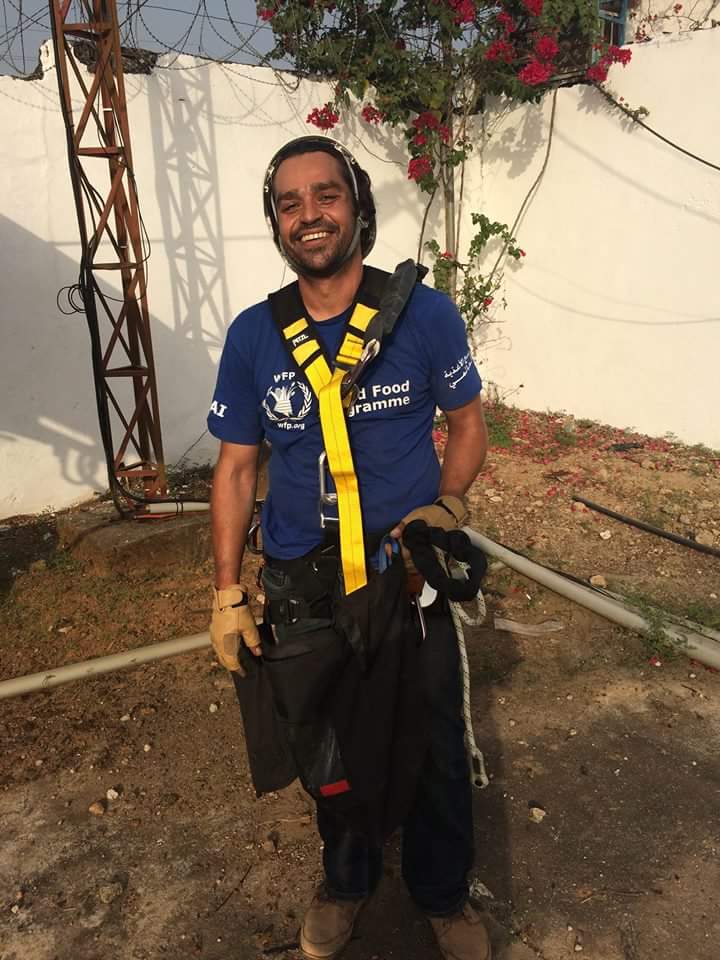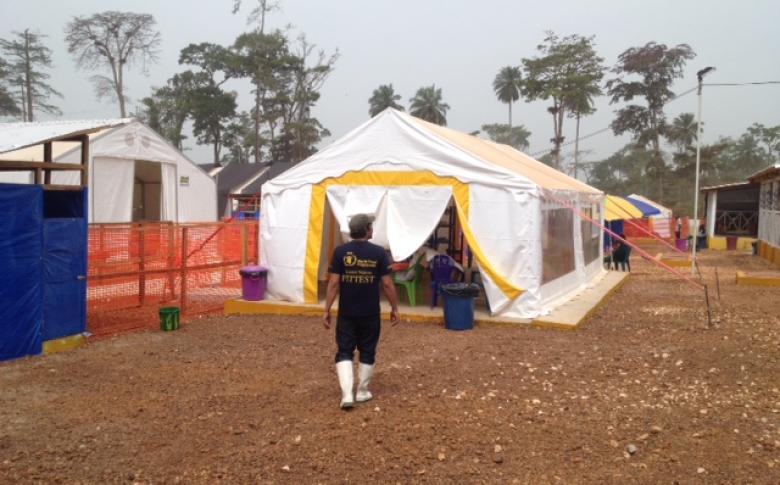
How Rami Returned Home to Help Bring Ebola Under Control

In West Africa, the ET Cluster is providing internet connectivity and radio services to treatment units, government response centres and NGO offices as part of the Ebola emergency response. Here we speak with Rami Shakra, ET Cluster Emergency Coordinator for the Ebola Response in the region. Rami was born and raised in Liberia where he lived until he was 15 years old. Twenty-five years later, working out of Monrovia, he is back on familiar ground.
The fear factor played a big role, especially when working in the Ebola Treatment Units (ETUs). Uncertainty was high and we were very much exposed to danger. When I joined the mission, many deployees hadn't gone out to those locations yet.
Can you tell us more about some of the work you've been involved in?
I first got deployed to Guinea, during the peak of the emergency. At that time ET Cluster was focusing on providing internet and radio in the ETUs, especially in the forest area of Guinea.
I remember the experience in ALIMA [an NGO] Treatment Unit in N'Zerokore region. One of the problems ALIMA staff were facing was a lack of communication when getting Ebola patients from the different villages to the ETUs with the ambulances.
ET Cluster set up radio communications services in ALIMA's ambulances, offices and ETU. That felt very rewarding because you could see that you helped them respond, and potentially even save lives more quickly, than they were doing before.
In that same ETU, as in many others across the three Ebola-affected countries, ET Cluster also provided wireless internet to connect the ETU's red zone – where the doctors assist the patients – to the green zone, where the rest of the staff were working. This helped the two teams work together and ensured a faster and more precise sharing of information on the status of patients.
Before, they were shouting the information across and sometimes it was very difficult for the doctors to communicate what they needed.

What was the most satisfying aspect of this work?
I felt very proud to see how ET Cluster was able to work hand in hand with health workers, who I believe are the real heroes of this emergency, and give a response based on their needs. Working closely with the health workers, and making their life and work conditions a lot better, was probably the most rewarding feeling of the whole Ebola response to date. I had a real feeling of helping to fight Ebola.
Why do you think Liberia reached zero cases of Ebola by 9 May?
The advertising of Ebola has been similar across the three countries but here in Liberia it is a bit stronger. And I think that the people themselves, believing that Ebola is something genuine, is also a big factor. I remember in the forest in Guinea talking to people who thought that Ebola had been brought by UN or foreigners. I hear that a lot less here. I hear more their concern about getting Ebola and making sure that they do everything they can to help stop Ebola collectively. I believe all of these factors have something to do with Liberia getting to the finish line. How people reacted made the difference.
Now that the Ebola Emergency is slowing down, what are the next steps?
ET Cluster is now scaling down its operation. The exit strategy is always challenging. There is a lot to consider when it comes to decommissioning the equipment and handing over the services to local providers. Building IT capacities of local staff is one of the main pillars of our phase-out strategy. The most important thing is to ensure a smooth transition of the IT services to commercial groups, avoiding any possible interruptions.
What is the main quality that ET Cluster brought to the Ebola response?
What makes ET Cluster stand out is the sense of urgency it brings to an emergency. Staying calm and focused under pressure is not an easy task, especially when it is needed the most, and demands are high from many customers. ET Cluster personnel are used to working in such environments, therefore they bring leadership and focus to the teams they lead or work alongside. ET Cluster in this operation has not found excuses for obstacles thrown its way. Instead staff found solutions and creativity to get the tasks at hand done.
From a personal perspective, how has it felt to be back to the country where you grew up, after so many years?
I love Liberia because it has a "homey" feeling. It's good to be here again and to meet good friends from high school who remained and now run their own businesses. I know the local Liberian English and this helps me a lot in my daily job. Speaking with people in their own dialect is the best way to understand their needs. I am grateful to have been deployed to a country that is very familiar to me.
Lots of things have changed but many others still remain the same. Growing up in Liberia was challenging when it came to medical attention. Any serious illnesses meant we had to leave the country. There has been no change 25 years later. Ebola has exposed the poor health system in Liberia, but it has also been a blessing in disguise since the development work that will take place post-emergency will focus on improvement of the overall health system in the country. From that perspective, it is comforting to see the efforts being made to improve the health system.
By Lia Carboni & Suzanne Fenton, IT Emergency Preparedness & Response branch, World Food Programme